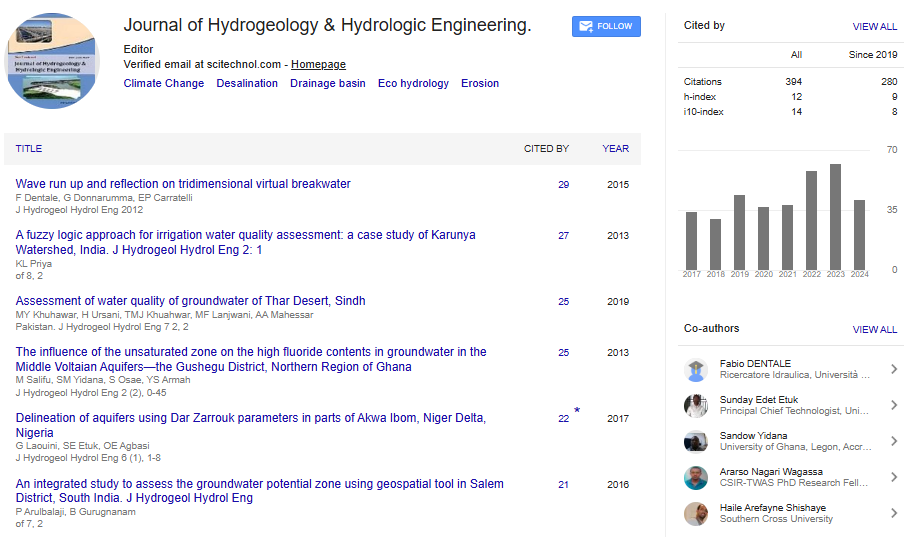Perspective, J Hydrogeol Hydrol Eng Vol: 13 Issue: 4
The Role of Hydrologic Engineering in Sustainable Water Management
Kaisheng Luo*
1Department of Civil Engineering, SRM Institute of Science and Technology, Tamil Nadu, India
*Corresponding Author: Kaisheng Luo,
Department of Civil Engineering, SRM
Institute of Science and Technology, Tamil Nadu, India
E-mail: luokaisheng45@gmail.com
Received date: 29 July, 2024, Manuscript No. JHHE-24-149243;
Editor assigned date: 31 July, 2024, PreQC No. JHHE-24-149243 (PQ);
Reviewed date: 14 August, 2024, QC No. JHHE-24-149243;
Revised date: 21 August, 2024, Manuscript No. JHHE-24-149243 (R);
Published date: 29 August, 2024, DOI: 10.4172/2325-9647.1000331
Citation: Luo K (2024) The Role of Hydrologic Engineering in Sustainable Water Management. J Hydrogeol Hydrol Eng 13:4.
Description
Hydrologic engineering plays an essential role in managing the water resources of our planet, particularly in the face of increasing environmental challenges. As the branch of civil engineering that deals with the flow, distribution and management of water, hydrologic engineering is essential for flood control, water supply management, irrigation and environmental conservation. With growing concerns over climate change, population growth and urbanization, the field of hydrologic engineering is becoming more precarious to ensure sustainable water use and minimize the impacts of water-related disasters.
Hydrologic engineering involves the study and application of principles of hydrology the science of water movement on and beneath the Earth's surface. It incorporates various aspects of water behavior such as precipitation, evaporation, runoff and the interaction of water with the environment. These principles are applied to develop strategies for controlling and managing water to meet the needs of society while preserving natural ecosystems.
Engineers in this field focus on designing systems that manage water efficiently, including dams, levees, canals, drainage systems and reservoirs. The design and construction of these systems require a thorough understanding of hydrologic cycles, water balance and environmental factors. Hydrologic engineers also integrate advanced technology, such as Geographic Information Systems (GIS), computer modeling and remote sensing, to simulate water systems and forecast potential issues like floods or droughts.
One of the primary goals of hydrologic engineering is sustainable water resource management. With water being a finite resource and demand increasing, hydrologic engineers play a pivotal role in ensuring that water is available for agricultural, industrial and domestic use. They work to create balance, making sure that water withdrawals do not exceed the amount replenished by natural processes.
Water management systems designed by hydrologic engineers not only provide water for consumption but also help control water quality, reduce pollution and maintain river ecosystems. For example, storm water management systems are designed to capture and treat rainwater runoff, reducing the risk of contamination and flooding in urban areas. These systems also help recharge groundwater aquifers, ensuring long-term water availability.
Floods are one of the most common and destructive natural disasters worldwide and hydrologic engineers are at the forefront of efforts to mitigate their impacts. By designing flood control infrastructure, such as levees, spillways and detention basins, hydrologic engineers help protect communities from the devastating effects of flooding.
Moreover, hydrologic engineering incorporates flood forecasting and early warning systems. These systems use data from rain gauges, river flow measurements and satellite images to predict flood events. By providing advanced warnings, hydrologic engineers give communities time to prepare, reducing loss of life and property.
Climate change is altering global weather patterns, causing shifts in precipitation and increased frequency of extreme weather events. This directly affects water availability and increases the risk of floods and droughts. Hydrologic engineers are tasked with adapting water management systems to address these new challenges.
They are developing innovative solutions, such as green infrastructure, which combines natural and engineered elements to manage water sustainably. Green roofs, rain gardens and permeable pavements are examples of systems that mimic natural processes to capture, treat and reuse water, reducing the strain on conventional water management infrastructure.
Conclusion
Hydrologic engineering is a vital discipline that ensures the sustainable and efficient management of water resources. As the demand for water increases and environmental challenges such as climate change and urbanization intensify, the role of hydrologic engineers becomes increasingly important. By developing innovative and adaptive water management systems, hydrologic engineers are helping to protect the environment, moderate water-related disasters and ensure that future generations have access to clean and abundant water resources.
 Spanish
Spanish  Chinese
Chinese  Russian
Russian  German
German  French
French  Japanese
Japanese  Portuguese
Portuguese  Hindi
Hindi 
